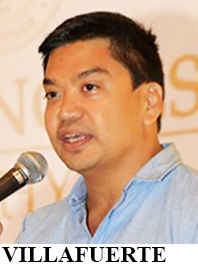CA affirms Batalla’s acquittal in libel case
- Bicolmail Web Admin

- Dec 29, 2023
- 3 min read
By JASON B. NEOLA
Upholds freedom of speech and of the press
The Court of Appeals (CA) has upheld the Regional Trial Court (RTC) Naga’s decision acquitting former Camarines Sur Board Member Carlo Batalla, an anti-corruption advocate, in the libel case filed on September 19, 2016 by Luis Raymund Villafuerte, former Camarines Sur governor.

The CA decision, which was penned by Associate Justice Edwin D. Sorongon, in concurrence with two other associate justices of the 7th Division, also dismissed the petition for certiorari that alleges that RTC Naga Branch 61 Judge Soliman M. Santos, Jr., in whose sala the case was tried, has committed grave abuse of discretion.
“Wherefore, the Petition for Certiorari is hereby dismissed. The judgment dated October 18, 2022 of the Regional Trial Court of Naga City, Branch 61, in Criminal Case No. 2016-0732 is affirmed. So ordered.” the verdict said. The libel case stemmed from a press conference held by Batalla on September 25, 2015, by which he made statements accusing Villafuerte of corruption, stealing and misusing public funds during his tenure as governor of Camarines Sur.
Villafuerte, considering the remarks defamatory, filed a criminal complaint for libel against Batalla. The subsequent trial led to Batalla’s acquittal, with the RTC ruling that his statements were a free expression of opinion based on reasonable grounds and thus did not amount to libel, more so against a public official in the performance of his functions. The RTC Judgment, issued on October 18, 2022 by Judge Santos, had sparked some controversy and led to a Petition for Certiorari seeking its reversal.
Petition for Certiorari

Undeterred by the acquittal, Villafuerte, with the support of the Office of the Solicitor General, filed a Petition for Certiorari at the Court of Appeals. The petition alleged that Judge Soliman M. Santos, Jr., committed grave abuse of discretion by disregarding evidence and relevant jurisprudence in acquitting Batalla.
The CA decision, concurred in by Associate Justices Ruben Reynaldo G. Roxas and Eduardo S. Ramos Jr., dismissed the petition, asserting that the facts were uncontested since Batalla did not deny uttering the alleged defamatory words. The central issue was whether Batalla’s statements, accusing LRay Villafuerte of corruption, were characterized by actual malice against a public official so as to make them libelous. Based on the ruling by the 7th Division of the Court of appeals: To be liable for libel, the following elements must be shown to exist: (a) the allegation of a discreditable act or condition concerning another; (b) publication of the charge; (c) identity of the person defamed; and (d) existence of malice.
Article 354 of the Revised Penal Code presumes malice in defamatory imputations unless good intention and justifiable motive are shown. However, the court noted that criticisms against public officials and figures enjoy a degree of privilege, requiring the prosecution to prove actual malice.
The CA rejected LRay Villafuerte’s claim of actual malice, highlighting his status as a public figure and the lack of supporting evidence. It also considered Batalla’s role as an advocate against corruption and a former provincial board member.
The CA concluded that there was no grave abuse of discretion on the part of Judge Santos, and so the Petition for Certiorari was dismissed. The CA then affirmed Batalla’s acquittal in the RTC Naga Criminal Case No. 2016-0732 Judgment of October 18, 2022.
Carlo Batalla remains acquitted of the libel charges filed by LRay Villafuerte. Judge Santos has since retired as of November 1, 2022.
Most importantly, the CA decision underscored the importance of protecting freedom of speech and of the press, after discussing key Supreme Court Decisions around Borjal vs. Court of Appeals, in this way:
“Evidently, Borjal began a shift towards stronger protection of the freedom of speech and of the press. As discussed by the Supreme Court in the above-cited cases, criticisms against public officials and public figures must be protected, lest the Constitutional guarantee of freedom of speech be rendered inutile. To rule otherwise would create a chilling effect on would-be critics and journalists for fear of being criminally charged.”
“... a plain reading of Borjal and all subsequent jurisprudence shows that the Supreme Court consistently referred to the freedom of speech and the press. To limit the protection of criticisms against government officials to members of the press alone would be absurd. Every citizen bears the privilege to speak out against corruption or other ill practices of government officials who are duty-bound to act lawfully and ethically in discharging their mandate.”

Comments